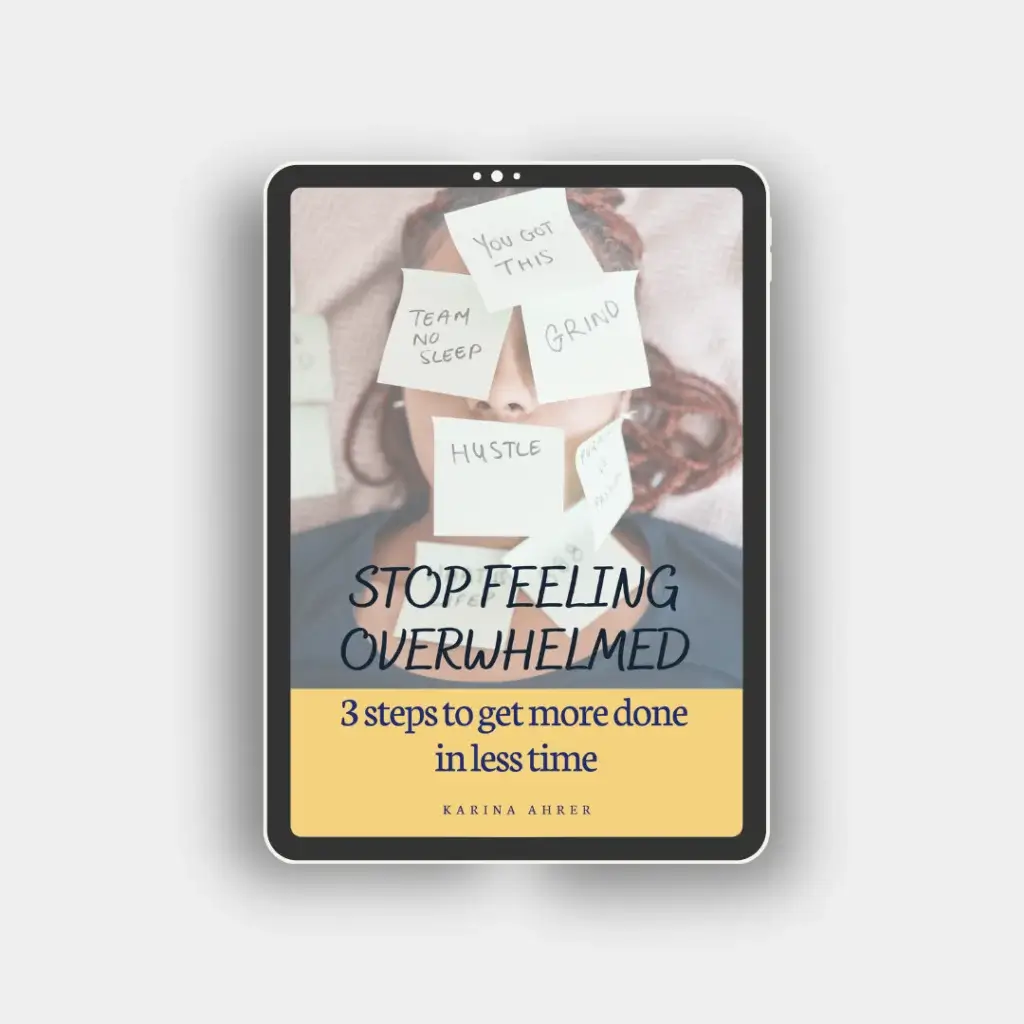What I learned from 2 years of juggling 3 projects
For 2 years during my studies,
I was:
- studying
- working part-time
- the president of a student organization
and I had time for my boyfriend and family.
This doesn’t mean I barely passed those projects or was bad at my job.
I was:
- reliable
- on time
- prepared
- ready to take action
- productive
and nobody could say I was bad. I actually got the opposite feedback.
How did I manage to do all that and get positive feedback too?
Some of it was because I had to do it.
It was COVID, and we didn’t find anyone to do the job of the president. It took me a little longer to do my master’s, but I was at the same pace as some friends who “only” worked part-time.
And I worked 25 hours to earn the money I needed.
In retrospect, I’m not sure how I did everything. It seems like a lot.
But it shows us that more is possible with the right management, planning, and willpower.
I wouldn’t do anything differently because I learned so much during those years and grew so much.
Time is the same for everyone. 24 hours days. 7 days a week.
The same amount of time for you, me, Taylor Swift, Bill Gates, Joe Biden,…
But what we can manage is ourselves and how we use the time.
Here are my secrets how I used the time to do more:
Small habits
There are some small habits I have implemented from years of stressful experiences that help me now:
- weekly planning ahead
- having my calendar with me
- sleeping 7–8 hours
- waking up earlier to do stuff before going to work
- morning routine
During the first years of my studies, I found myself stressed out and unhealthy. I made a lot of mistakes:
- I did everything as fast as possible
- I slept less during the exam period
- I ate unhealthy food or nothing to take fewer breaks
- I always searched for the short-cuts
- I didn’t take any breaks
- But wanted to be at every party too
The good thing: I learned from those mistakes. I knew I couldn’t continue like that. I didn’t get the best grades, and I was tired and unhealthy.
So I read about time management, habits, and morning routines, and I implemented them.
Every Sunday, I’m planning the week. I get an overview of all the meetings I have, and what needs to get done, find the priorities, and put everything on my calendar.
Additionally, I make sure to stick to healthy routines like sleeping 7 to 8 hours and taking breaks to eat healthy.
Those habits are small changes that greatly impact my daily productivity.
Morning routine
I didn’t have the full morning routine I have now.
But I:
- meditated
- had a good breakfast
- fast bathroom routine
I made sure that I didn’t have a stressful morning. So I started with a calm meditation to focus on the present. And finish with a healthy breakfast that my stomach needs to have the energy to work.
During the most stressful times (before a submission), I started working on my university stuff at 8 am and continued after my job in the evening. I still slept 7 hours (that’s a priority) and had my breakfast.
It’s important to stick to routines because your brain is used to them and doesn’t need to think about them a lot. So you can focus your thoughts on more important things.
Your body is used to those routines. It knows how to stay healthy with them. Changes can have a big impact on your productivity or energy level.
The Time Management Hack: Time blocks
I was very strict about my time.
I didn’t want to waste it.
So I really 100% only worked the 25 hours I got paid to do.
If there was a submission at work, of course, I did more. And nobody complained.
I had fixed time blocks for the different parts of my life, and I stuck with them. The weekend was a flexible time.
I planned the weeks in advance and put the time blocks on my calendar. And I communicated those to everyone.
As the president, I needed some flexibility for emergencies. So some time blocks were fluid.
The same goes for group projects. The time blocks depended on the other person’s availability.
My work hours were flexible, which was a really good thing. As long as I did my 25 hours, everything was fine.
Overview
I always had an overview.
I wrote everything down in my calendar.
My calendar is my holy bible for knowing everything.
Writing down everything immediately is the best tool ever.
You cannot remember everything. At some point, your brain will delete stuff, especially when you have a lot going on.
So writing down is like having a second brain that remembers the stuff for you.
Use it!
Every meeting. Every birthday. Every time block. Every to-do.
Every possible event. Every submission.
Everything was on my calendar.
This helped me have an overview all the time. No matter how stressful it was: everything on my calendar didn’t get lost.
Use the tools available and find your own strategy for keeping an overview!
Communication
My WhatsApp was buzzing.
I communicated with everyone a lot, and I delegated tasks.
This can be positive or negative.
It’s positive to have direct and fast communication with my team, but on the other side, it shouldn’t distract from important work.
The time blocks define the amount of time I have for a specific project. During those hours, I usually don’t get distracted by my phone.
It’s always on silent (I just don’t like to bother anyone with my sounds).
I always tell my team that communication is key.
- it prevents problems
- it prevents mistakes
- it prevents misunderstandings
- it prevents doing things twice
- it helps to keep an overview
- it prevents feelings from getting hurt
It’s important in every aspect of life.
At work. With your family. In every kind of relationship.
I learned that the hard way a few years ago.
I was never a big communicator, because I didn’t want to bother people.
Now: I don’t care anymore.
I write about everything in the WhatsApp groups because I cannot be 100% sure that the people know what I’m thinking about.
- What they need to do
- How they need to do it
- They need to do it now
- Where to find the information
It’s better to say it twice instead of having misunderstandings and something not getting done.
Step by Step
To not get overwhelmed, I always took one step at a time.
And those steps were based on my prioritization.
I knew the most important 20% of a project because I listened to my team members and my professors.
Every project is made up of smaller tasks, and during my time blocks, I knew exactly what to work on.
By planning ahead and having an overview, I knew exactly what needed to get done next.
I didn’t have a step-by-step plan for every project.
From experience, I knew how projects at the university worked.
And at my student organization, we have a lot of how-tos and experienced members showing us what to do.
Every project looks big at the beginning, and we tend to procrastinate when we get overwhelmed.
The key is to take it step by step, day by day, to continue the work.
Conclusion
Don’t forget: Nobody is perfect!
Even though it sounds like I managed everything very well, and I got positive feedback: I didn’t do a perfect job with anything.
Nobody could.
You can never satisfy everyone!
What you can do: give your best!
That’s what I did, too.
If I can do all those things at the same time: you can too!
Less Stress. More Time. Less Overwhelmed!
Get your free copy of my 3 steps!

Get daily insights, motivation, and inspiration:
If you are as addicted as I am to reading books, check out my favorite books!




